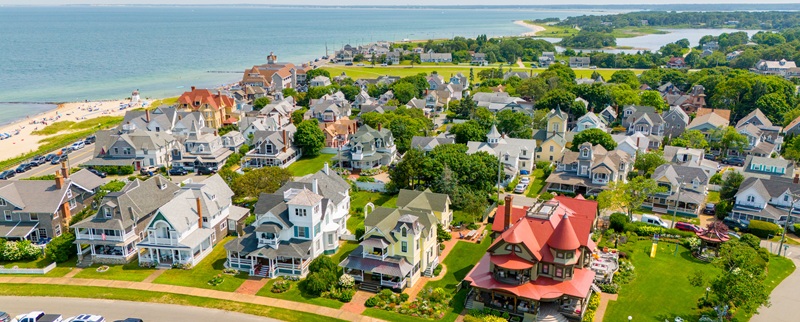Your roof’s expected lifespan affects how you plan maintenance and budget for one of your property’s biggest expenses. In Massachusetts, roofs face conditions that can cut short how long they protect your home. The state’s four-season climate brings harsh winters with heavy snowfall, humid summers, and dramatic temperature swings that place extraordinary stress on roofing materials. Coastal homeowners deal with salt air corrosion, while everyone across the Commonwealth battles ice dams and freeze-thaw cycles that speed up deterioration.
Key Factors That Affect Roof Lifespans in Massachusetts
Massachusetts roofs face a demanding combination of weather conditions that can significantly reduce their expected lifespan compared to milder regions. The state’s four-season climate brings harsh winters with heavy snowfall, humid summers, and dramatic temperature fluctuations throughout the year. These conditions create constant stress on roofing materials through expansion and contraction cycles that accelerate wear and tear. Coastal areas face additional challenges from salt air, which corrodes metal components and degrades shingles faster than inland locations.
Ice dams rank among the most destructive forces affecting Massachusetts roofs. These ice buildups form along roof edges when heat from the attic melts snow on the upper portions of the roof, sending water down to refreeze at the colder eaves. The trapped ice forces water backward under shingles, causing leaks, lifting shingles, damaging roof sheathing, and tearing off gutters. Many homeowners don’t realize they have ice dams until water stains appear on ceilings or walls, by which point significant damage has already occurred. Poor attic insulation and ventilation worsen ice dam formation by allowing too much heat to escape through the roof deck.
Freeze-thaw cycles throughout late winter and early spring compound the damage ice dams create. As temperatures swing above and below freezing, water trapped in small cracks and gaps expands when it freezes, widening those openings and allowing more moisture infiltration. This cycle repeats dozens of times each season, gradually breaking down even quality roofing materials. Shingles become brittle and crack, flashing separates from penetrations, and sealants fail. What starts as minor deterioration can accelerate into major problems requiring premature roof replacement.
Material choice and installation quality play critical roles in how long a Massachusetts roof survives these conditions. Asphalt shingles typically last 15 to 30 years in the state, with architectural shingles outperforming basic three-tab options. Metal roofing can reach 40 to 70 years, while slate and tile roofs may last 50 to 100 years if properly installed and maintained. However, even premium materials fail early without proper attic ventilation, adequate insulation, and professional installation. Regular maintenance—including gutter cleaning, debris removal, and prompt repairs—extends roof lifespan by preventing small issues from escalating into major damage during Massachusetts’ challenging weather cycles.
Average Roof Lifespan in Massachusetts Based on Materials
Some of the most popular types of roofing materials found on homes across Massachusetts:
Asphalt Shingles
Asphalt shingles dominate Massachusetts roofing due to their affordability and versatility, but their lifespan varies considerably based on quality and type. Standard three-tab asphalt shingles typically last 20 years in Massachusetts, while architectural or dimensional shingles can reach 25 to 30 years when properly installed and maintained. Premium asphalt options can push toward 30 years or more, though this requires quality installation and regular upkeep. Massachusetts homeowners choosing asphalt should recognize that the state’s harsh winters, freeze-thaw cycles, and ice dams can reduce these lifespans compared to milder climates, making material quality and proper installation particularly important for maximizing longevity.
Metal Roofs
Metal roofing offers significantly longer performance in Massachusetts conditions, lasting 40 to 70 years depending on the metal type and gauge. Steel and aluminum options handle the state’s snow loads effectively while shedding ice and resisting the corrosion that coastal salt air causes. Metal roofs require minimal maintenance once installed and prove particularly valuable for homeowners planning to stay in their homes long-term. The higher upfront cost compared to asphalt becomes justified when considering that a metal roof may be the last one a homeowner needs to install during their lifetime in the property.
Slate Roofs
Slate roofing stands at the top tier for durability in Massachusetts, with natural slate lasting 75 to 100 years or longer when properly installed and maintained. This natural stone material handles the state’s freeze-thaw cycles better than most alternatives and resists damage from ice dams and heavy snow loads. Slate requires substantial structural support due to its weight and comes with considerably higher installation costs than other roofing materials. However, the lifespan means you may never need another roof replacement, making it a smart investment for high-end properties where homeowners plan to stay long-term and want a roof that outlasts everything else on the house.
Signs It May Be Time to Replace Your Massachusetts Roof
Your roof’s age provides the first indicator that replacement may be approaching. Most asphalt shingle roofs in Massachusetts reach the end of their useful life between 20 and 30 years, depending on the quality of materials and installation. If your roof is approaching or has exceeded this timeframe, start planning for replacement even if you haven’t noticed obvious problems. Massachusetts’ harsh climate accelerates aging, and older roofs become increasingly vulnerable to leaks and damage during winter storms and ice dam formation.
Visible shingle damage tells you the roof is deteriorating and losing its protective capabilities. Curling, cracking, or missing shingles indicate your roof has reached the end of its lifespan and can no longer effectively shed water. Look for shingles that are buckling or have lost significant amounts of granules, which often collect in gutters and downspouts. In Massachusetts, where freeze-thaw cycles stress roofing materials repeatedly, these signs progress faster than in milder climates. Once shingle damage becomes widespread across multiple roof sections, repairs become a temporary fix and full replacement makes more financial sense.
Interior warning signs often reveal roof problems before exterior damage becomes obvious. Water stains on ceilings or walls, damp spots in the attic, or visible daylight shining through the roof boards all signal that water is penetrating your home’s envelope. Peeling paint on ceilings or walls near the roofline can indicate chronic moisture problems from a failing roof. Massachusetts homeowners should pay particular attention to these signs in late winter and early spring when ice dams force water under shingles and into living spaces. If you find multiple leak locations or widespread water damage, the roof has likely failed beyond the point where isolated repairs will solve the problem.
A sagging roof deck demands immediate attention and typically requires complete replacement. Sagging indicates structural damage from prolonged water infiltration, which compromises the roof sheathing and potentially the rafters and trusses supporting it. This serious condition poses safety risks and will only worsen if left unaddressed. Similarly, if you notice your roof looks uneven or wavy when viewed from the street, the underlying structure may be failing. These structural issues go beyond simple shingle replacement and require professional assessment to determine the extent of damage and necessary repairs to ensure your home remains safe and protected.
How to Improve the Longevity of Your Massachusetts Roof
Regular professional inspections catch problems before they turn into expensive repairs or premature replacement. Schedule roof inspections at least twice per year, in spring and fall, to assess damage from winter weather and prepare for the next cold season. Massachusetts homeowners should also arrange inspections after severe storms, heavy snowfall, or any weather event that might have caused damage. A trained professional can spot issues invisible from the ground, including loose or damaged shingles, compromised flashing, and early signs of ice dam damage.
Keep gutters and downspouts clean and functioning throughout the year, and remove debris from your roof’s surface regularly. Clogged gutters prevent water from draining off your roof, causing it to back up under shingles or pool along roof edges where it can freeze during winter. This creates ice dams that force water into your home’s structure and speed up roof deterioration. Clean gutters at least twice annually, more often if you have trees near your home. Sitting debris in valleys and along roof sections traps moisture against roofing materials, speeding up deterioration and creating conditions for mold and algae growth. Trim overhanging tree branches that drop leaves onto your roof or scrape against shingles during windy conditions, as this physical contact removes protective granules and damages the surface.
Proper attic ventilation and insulation play critical roles in extending roof lifespan, especially in Massachusetts’ climate. Good ventilation prevents heat buildup during summer that speeds up shingle aging, while proper insulation combined with ventilation stops warm air from escaping through the roof deck in winter. This prevents the snow-melting cycle that creates destructive ice dams. Check that your attic has balanced intake and exhaust ventilation and that insulation meets current standards for the region. These systems working together reduce stress on your roof year-round and prevent the moisture problems that lead to premature failure.
FAQs: Roof Longevity in Massachusetts
Our most frequently asked questions from homeowners in Massachusetts about the condition of their roofs:
How often should I replace my roof in Massachusetts?
Asphalt shingle roofs in Massachusetts typically need replacement every 20 to 30 years, depending on material quality and weather exposure. Metal roofs can last 40 to 70 years, while premium materials like slate may last 75 to 100 years or more. Regular inspections help determine when your specific roof has reached the end of its lifespan, as Massachusetts’ harsh winters and coastal conditions can shorten these timeframes.
What type of roofing material lasts the longest in Massachusetts?
Slate roofing lasts the longest in Massachusetts, with natural slate roofs reaching 75 to 100 years or more when properly installed and maintained. Metal roofing comes in second with a lifespan of 40 to 70 years, while tile roofs can last 50 years or more. These premium materials handle Massachusetts’ harsh winters, coastal conditions, and freeze-thaw cycles far better than standard asphalt shingles but these other materials come at a significant cost.
Get Your Free Roof Replacement Quote
Need to know how long your Massachusetts roof will last or if it’s time for a roof replacement? DaBella has served homeowners across the state since 2020, bringing local knowledge of New England’s demanding climate. With offices in Quincy and Westborough, our team knows the seasonal stresses your roof faces—from heavy snow loads to strong coastal winds—and can help you plan for long-term performance.
As a GAF Master Elite Roofer, DaBella meets strict standards for workmanship, training, and reliability. Your roof gets installed to exact specifications and backed by industry-leading GAF warranties for added protection. We install GAF Timberline HDZ asphalt shingles, engineered for durability, superior wind resistance, and curb appeal that complements Massachusetts homes.
Ready to schedule a no-obligation estimate? Contact us today at 844-DaBella. Our local teams in Quincy and Westborough are available to answer questions, provide a detailed quote, and help you protect your home with a roof built for Massachusetts weather.

